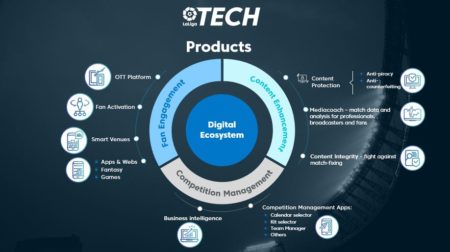Insights from Fabio Gallo

The launch of LaLiga Tech in September last year was billed as the first of its kind to combine the experience of an international sporting organization with “deep technical expertise” for creating direct-to-consumer (D2C) fan experiences.
Joining the LaLiga-owned technology startup six months ago, the division’s product lead Fabio Gallo is charged with delivering the roadmap for the company’s global product development, including solutions for LaLiga and its clients across the sport industry.
For example, LaLiga’s latest over-the-top (OTT) streaming service – LaLiga Pass – is being rolled out in Thailand and Indonesia this month, becoming the first platform within the league’s expanding D2C inventory to provide fans with access to every top-tier LaLiga Santander and second-tier LaLiga SmartBank match via web, mobile devices, or smart TV.
Speaking to N3XT Sports, Gallo says the launch of LaLiga Pass isn’t only a significant step in LaLiga’s own digital transformation, but also LaLiga Tech’s understanding of the OTT landscape, including how its data-driven solutions can help affiliated sports organizations increase fan engagement and improve returns on investment (ROI) in their own digital infrastructure.
1. How is LaLiga Tech supporting the organization’s digital transformation?
Our vision at LaLiga Tech is built on two pillars: firstly, to serve all of LaLiga’s digital assets and to evolve them in a more efficient way; and, secondly, to leverage all of our technology and data solutions to help other organizations in the industry on their own digital transformation, anywhere in the world.
The only way to do that was to transform LaLiga from a media company into a product company. Fan engagement is one of our main focuses but the strategy that we’re building is driven primarily by data. LaLiga started developing its digital and data infrastructure in 2013 and now we are making it the core of everything we do, across three key pillars.
Of course, data-driven solutions support fan engagement activation that help LaLiga and its partners better understand fan behavior. However, LaLiga Tech also supports on product enhancement, including protection from piracy and match fixing. Our third pillar is based on competition management and the creation of tools that enable LaLiga and our clients to grow their respective sports more efficiently.
Bringing to market data-driven and data-compatible solutions isn’t only important for fan engagement, competition management, or content enhancement. In return, it also plays an important role when rights holders like LaLiga sit down and negotiate with partners, bringing to the table an array of digital solutions attractive to a third-party media rights holder.
2. LaLiga Pass is built 100% by LaLiga Tech. Why is this significant?
LaLiga Tech’s primary role is to leverage LaLiga’s digital assets and to evolve them into more strategic market solutions. Being able to build our own digital solutions exclusively using proprietary technology is a key element of that evolution.
The launch of our digital products is not only about user consumption but also measuring the user journey and ensuring that the fan data we gather is interconnected. In order to achieve this, it’s important that we do not silo any of our solutions. We also work with other sports properties, too – to create customer-intelligence solutions that enable them to profile, segment, and cluster users, and ultimately to track fan behavior – all within the same ecosystem – so as to generate a better understanding of the user.
The testing phase for LaLiga Pass really started in 2019, when we launched a separate multi-sport OTT service LaLigaSportsTV, which became the first of LaLiga’s digital solutions in the market to begin to understand what OTT is, how it’s evolving, and the consumer behaviors inside the D2C space.
By launching LaLiga Pass in Thailand and Indonesia – two countries where we already have a media partner – we believe that going directly to the consumer can generate engagement with fans in those territories in addition to the existing linear broadcasts and generate ROI for LaLiga. This is only the start for LaLiga Pass and LaLiga’s D2C technology development.
There is some chance to bring the solution to other countries in the future as well. As with the other technologies we’re working on, data sits at the core of everything we do.
“Our vision at LaLiga Tech is built on two pillars: firstly, to serve all of LaLiga’s digital assets and to evolve them in a more efficient way; and, secondly, to leverage all of our technology and data solutions to help other organizations in the industry on their own digital transformation, anywhere in the world.”
3. How does data shape LaLiga’s fan engagement strategy?
The sports industry is experiencing its biggest ever transformation. We are seeing the transformation of B2B sports companies into B2C businesses, or in some cases D2C organizations. Admittedly, the digitalization of the sports industry is much slower compared to other industries. However, it’s a transformation that’s now happening and is accelerating in the wake of Covid-19.
Sport is a very traditional industry and it’s easier to deal with B2B contracts for selling content to a third party. Therefore, if you want to go direct to the consumer, you need to hire the brightest talent, and you need to have the right experience because B2C is very different to B2B. It’s a different game altogether to understand what the user wants, how to engage them, and how they will generate revenue for the company.
LaLigaSportsTV, for example, was focused at the beginning on the Spanish market. LaLiga acquired rights for different sports in the country – from basketball and handball to hockey and cycling – and the traction it created was very impressive. LaLigaSportsTV quickly generated more than two million registered users and, in the past year, generated 11 million more days of engagement than the previous year, with the help of user data and targeted campaigns to them.
Moving forward, with the launch of LaLiga Pass and our other digital solutions, we really are working hard to innovate products that align with our fan-activation teams and promote better ROI. A streaming service is not only a customer-facing product – its success also depends on how you choose to use the data it generates, in order to optimize the platform and make any alterations that increase both fan engagement and reduce user churn.

4. How is LaLiga Tech driving new commercial opportunities?
As recently as five years ago, sports organizations were talking about themselves as being media companies. I believe that we should now be changing that sentence to express that we’re not only a media organization, but a data-driven media and technology company, which is a big difference.
As well as streaming solutions, we’re exploring other technologies that can enhance D2C strategies in the sports industry. These could come from virtual reality (VR) technologies, esports, or marketplaces for NFTs and blockchain solutions. We help enhance and protect the content offering – not just for ourselves, but for many companies, including broadcasters, federations, leagues, and clubs – and we believe will have a huge influence on the bottom line of those companies.
Whatever solution we build for the market, whether it’s a mixed-reality experience or an owned streaming platform, everything needs to be under the control of the sports organization it serves and integrated into their data strategy. You can launch the best solution ever – but, at the end of the day, if you don’t understand what the user wants from a technology or how it’s used to communicate with them in a personal way, you find yourselves with a very short-term strategy.
What we’re building here at LaLiga Tech is a long-term strategy that supports both the wider LaLiga organization, including the digital ecosystem across its affiliated leagues and clubs, but also other sports properties. How the sports industry embraces this transformation will depend on the people and strategy it chooses to deploy today.
5. What advice would you give sports properties beginning their own digital transformation?
The best advice to give sports organizations beginning their own digital transformation is to avoid creating silos for their digital solutions. They should deploy analytics tools that can track every one of their digital assets. It’s important to be able to track the user when they leave a platform, for instance, and capture them when they subscribe to another of your digital platforms.
For LaLiga, this is crucial – yet we see very few sports companies doing this. We’re helping all of our clients to interconnect all their digital assets into a unique analytics tool. For example, we use telemetry to track user behavior at two different levels: the first to assist with the management of sports properties, helping them meet the right KPIs at the right time; and the second to deliver personalized fan activations which generate more ROI from campaigns designed for specific users.
Last November, for example, LaLiga Tech helped build and deliver World Padel Tour TV, the tour’s dedicated OTT platform, which generated more than 300,000 registered users within the first few weeks after its launch and has since reached more than 400,000 registered users.
At the time, World Padel Tour (WPT) didn’t have anything in place, so we developed their OTT platform from scratch, and are now planning to launch further digital assets this summer that will be interconnected. In doing so, the project helps the property to monetize the user experience via D2C campaigns or via sponsorship activations, giving WPT more visibility of its fans, what they are looking for, and how to generate more ROI. This is something we want to do with every sports property we work with.


